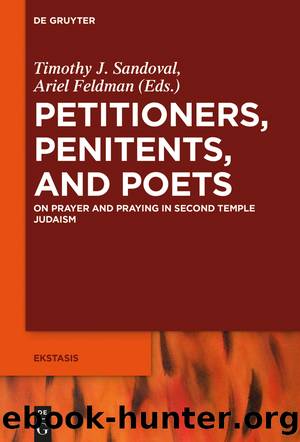Petitioners, Penitents, and Poets by Ariel Feldman Timothy J. Sandoval

Author:Ariel Feldman, Timothy J. Sandoval
Language: eng
Format: epub
Publisher: Walter de Gruyter GmbH
Published: 2020-01-15T00:00:00+00:00
3.Baruchâs Prayers: A Closer Look
2 Baruch 10:1â12:5: Baruchâs Lament
The first prayer in 2 Baruch is located between the bookâs narrative prologue in chapters 1â9 and the first extended dialogue section between God and Baruch in chapters 13â20. Having witnessed the destruction of Jerusalem, Baruch and Jeremiah lament and fast together for seven days (9:1). Then God sends Jeremiah away to the exiles in Babylon, whereas Baruch returns to the temple ruins (10:1â5), where he says his prayer (10:6â12:4). The author thus paints a vivid picture of the harrowing scene following the destruction of the city: Baruch and Jeremiah mourn, Jeremiah leaves, and Baruch, now left alone, says the bookâs first prayer while sitting on the ruins of the demolished temple. The focus of the scene is on Baruchâs lengthy prayer. After Baruch is done, he continues his fast for another seven days (12:5).
The seven-day fast just before the prayer is a recurring theme in 2 Baruch (9:1â10:1; 21:1). Here, as in other texts, fasting is a feature of mourning and repentance, an embodied practice associated with prayer (2 Sam 12:20; Neh 1:4; Dan 10:2â3).592 It may be a way for Baruch to make himself available for more revelations and possibly induce further visions (4 Ezra 5:13; Ascen. Isa. 2:7â11), though this is not as clear.593
Baruchâs first prayer in 10:6â12:4 is a lament over Jerusalem: âAnd I lamented this lamentation over Zion (10:5; cf. Ezraâs lament over Jerusalem in 4 Ezra 10:19â24). Bogaert regards the poem as one of the two qinot, or dirges, in 2 Baruch (of Hebr. âelegy, dirge;â cf. Amos 5:1; Jer 7:29).594 The prayer itself can be broken down into the following four components:595
Introduction: Call to Lament
10:6â7 Happy are the unborn, cursed the living
10:8 An invitation for demons to join in the lament
Cessation of the Natural and Social Order
10:9â12 Call to the natural world to stop producing its fruit
10:13â17 A call for weddings to cease and for women no longer to bear children
Return to God what is Godâs
10:18â19 A call to the priests to return the temple keys to God, and to the virgins to return their fine linen and silk to the Creator
Babylon and Jerusalem
11:1â3 Babylon prospers, while Jerusalem is devastated
11:4â7 Happy are the deceased ancestors
12:1â4 Oracle against Babylon
In many respects, Baruchâs lament over the fallen city is reminiscent of the book of Lamentations (Lam 1:1; 4:9), and, even more so, of Mattathiasâs lament over the defiled temple in 1 Maccabees (âAlas. Why was I born to see this, the ruin of my people, the ruin of the holy city?â [1Macc 2:7]). It has noticeably less in common with the individual laments in the biblical Psalter.596 The main themes are divided into the four main parts of the prayer. First, Baruch praises the dead who, unlike the living, do not have to witness Jerusalemâs destruction (cf. 4 Ezra 4:12; 5:35).597 The blessing for the deceased is repeated in 11:7, so that 10:6 and 11:7 form an envelope structure around the prayer. Bogaert calls this the âLeitmotivâ of the prayer.
Download
This site does not store any files on its server. We only index and link to content provided by other sites. Please contact the content providers to delete copyright contents if any and email us, we'll remove relevant links or contents immediately.
| African | Asian |
| Australian & Oceanian | Canadian |
| Caribbean & Latin American | European |
| Jewish | Middle Eastern |
| Russian | United States |
4 3 2 1: A Novel by Paul Auster(12359)
The handmaid's tale by Margaret Atwood(7737)
Giovanni's Room by James Baldwin(7309)
Asking the Right Questions: A Guide to Critical Thinking by M. Neil Browne & Stuart M. Keeley(5745)
Big Magic: Creative Living Beyond Fear by Elizabeth Gilbert(5733)
Ego Is the Enemy by Ryan Holiday(5400)
The Body: A Guide for Occupants by Bill Bryson(5067)
On Writing A Memoir of the Craft by Stephen King(4923)
Ken Follett - World without end by Ken Follett(4712)
Adulting by Kelly Williams Brown(4557)
Bluets by Maggie Nelson(4539)
Eat That Frog! by Brian Tracy(4505)
Guilty Pleasures by Laurell K Hamilton(4430)
The Poetry of Pablo Neruda by Pablo Neruda(4084)
Alive: The Story of the Andes Survivors by Piers Paul Read(4013)
White Noise - A Novel by Don DeLillo(3998)
Fingerprints of the Gods by Graham Hancock(3981)
The Book of Joy by Dalai Lama(3965)
The Bookshop by Penelope Fitzgerald(3831)
